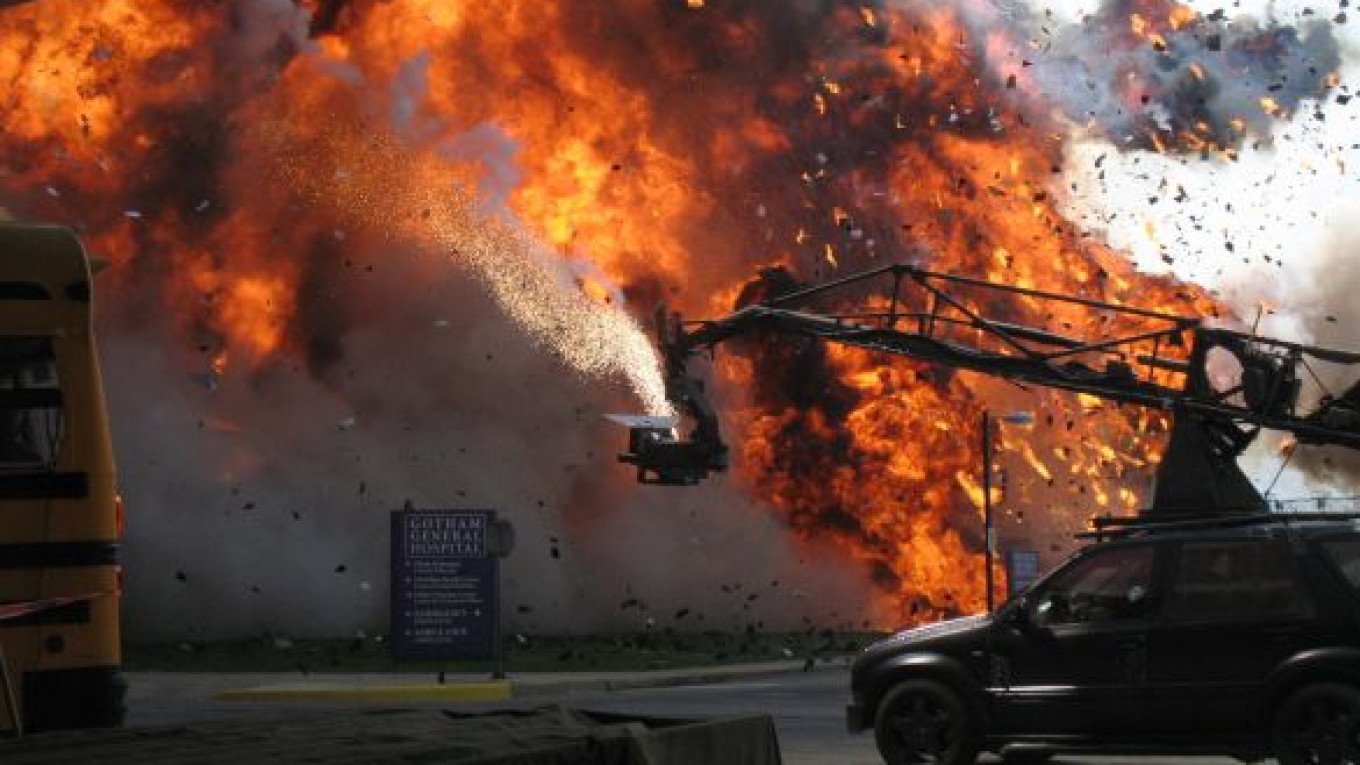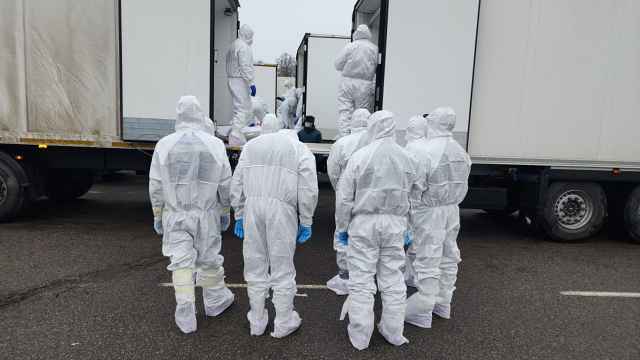They have sped on a boat alongside James Bond, chased the Dark Knight around the streets of Gotham City, watched Mr. Smith pelt golf balls at would-be assassins on a New York highway and followed John MacLane in his quest to take down a terrorist organization.
Film experts have said the gyro-stabilization cranes and camera platforms used in some of Hollywood's best-known action sequences and made by the Oscar-winning Leskov company are miraculous.
Vasily Orlov, director of the 20-person Tula-based enterprise that makes the equipment, agrees. He said it is a miracle that the company is still functioning.
"It's a wonder that we are alive, despite all that has happened in the past years," Orlov said.
He is uncertain about the company's long-term survival. Lev Evstratov, one of the inventors of the equipment and Leskov's former consultant, is also not optimistic about the fate of Russia's only producer of stabilization equipment for the film industry.
"Leskov is a marvel," Evstratov said. "There are no conditions for it to continue to exist."
Leskov appeared on the market in 2003, received a Technical Oscar in 2006 and has been struggling to stay afloat ever since.
Company representatives said they are trying to compete with a wave of cheaper film equipment from Ukraine and Belarus and have no hope of getting government support.
A Tough Playing Field
Leskov has Western and Russian partners that rent its equipment to film studios for specialized shots. But most of the company's profits are still from Western projects. Leskov's presence in Russia is minimal because the market is dominated by neighboring competitors.
"Moscow is spoiled by cheap equipment from Ukraine and Belarus," Orlov said.
Kiev-based Filmotechnic, one of Orlov's main rivals, has rental offices around the world, but its largest base is in Russia. The company is the exclusive equipment provider for all concerts in the Kremlin, and has filmed both Putin and Medvedev's inaugurations and Alla Pugacheva's Christmas gatherings, said Viktor Zhukov, head of Filmotechnic's distributor in Russia.
Zhukov said he orders equipment exclusively from Filmotechnic because of its quality and internationally recognized name. He said he is familiar with Leskov's equipment, but chooses to be loyal to his Kiev partners.
"I got married once. I married Filmotechnic," Zhukov said. "Even if there is Leskov, I won't cross that ethical boundary."
Orlov said that the Ukrainian and Belarussian competitors also hurt Leskov's business by stealing its ideas.
On the other hand, he can only charge about $500 per day on the Russian market for rental of his equipment, which is less than half of what he gets from U.S. customers.
Leskov does not have a web site and rarely participates in exhibitions because Orlov worries that competitors could take pictures of his innovative technologies and replicate them. Orlov said he saw his competitors do this regularly after Leskov showcased its products at industry events.
"There is nothing we can steal from them," Orlov said. "But they have stuff to steal from us because we put a lot of emphasis on the quality of our products."
Secrecy also helps to keep Leskov's labor costs more stable.
The company got publicity in 2006 when it won a Technical Achievement Award at the Oscars for its camera crane system. For Orlov, that just meant that he had to increase his workers' salaries. This was difficult since his payroll had already gone up to match national levels, Orlov said.
He fears losing talented engineers to defense industry companies if he cannot offer competitive salaries.
But his clandestine approach has its drawbacks. Despite its international achievements, Leskov is still fairly unknown outside of its immediate client base.
"The Russian product is not known," Evstratov said. "People in the West know that vodka is Russian. Oil too, even though there are no labels on gas stations. But not film equipment."
Leskov's competitors are advertising. Filmotechnic, which has won two Technical Achievement Awards, has a list of its credits on its web site.
The company is well known in Russia, Zhukov said.
"We don't have a note on our equipment saying that we won the Oscars, but everyone knows us," Zhukov said. "Everyone trusts our equipment. We are given permission to film in the presence of the Russian president and even film him from above."
Out of the Government's Focus
Orlov said he looked into government support programs during the media euphoria that surrounded the company's Oscar win. The Skolkovo Foundation, which offers grants to start-up technology companies, seemed to be a source of support.
Russian and foreign experts judge applicants [for support] according to how their work fits within Skolkovo's priority areas, the innovativeness of their technologies and their international experience, Sergey Kozhukhar, director of investor relations at the Skolkovo Foundation, said in an e-mail to The Moscow Times.
"These criteria are the same for all applicants, although winning significant awards, of course, can help in getting a positive decision from the experts," Kozhukhar wrote.
But Leskov failed to qualify for any government support because it was deemed to be too small, Orlov said.
"It turned out we were too small, and all the government's big proclamations from on high about supporting Russian technology producers didn't apply to us," he said.
The flood of foreign equipment into Russia is also possible because the government provides limited protection to domestic producers, Orlov said.
"The government takes no part in protecting local producers even though it beats its chest and says it wants to help develop national science and technology," Orlov said.
Orlov said he has given up on obtaining government funding and can now only depend on continued support from his partners in Los Angeles.
"They understand that if Tula doesn't get an order for the equipment now, tomorrow there will be no Tula, this whole team of specialists will disappear and a new one will not be formed," Orlov said.
Evstratov said he was optimistic about Leskov's future when the firm was first created, but the situation has only gotten worse in recent years.
"When the firm started, there was hope that things would not be this way," he said. "Back then salaries were lower and there was greater demand for more complex shots in filmmaking. We hoped that these conditions would continue to exist. They did not."
A Message from The Moscow Times:
Dear readers,
We are facing unprecedented challenges. Russia's Prosecutor General's Office has designated The Moscow Times as an "undesirable" organization, criminalizing our work and putting our staff at risk of prosecution. This follows our earlier unjust labeling as a "foreign agent."
These actions are direct attempts to silence independent journalism in Russia. The authorities claim our work "discredits the decisions of the Russian leadership." We see things differently: we strive to provide accurate, unbiased reporting on Russia.
We, the journalists of The Moscow Times, refuse to be silenced. But to continue our work, we need your help.
Your support, no matter how small, makes a world of difference. If you can, please support us monthly starting from just $2. It's quick to set up, and every contribution makes a significant impact.
By supporting The Moscow Times, you're defending open, independent journalism in the face of repression. Thank you for standing with us.
Remind me later.






